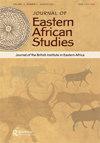大约1920-2014年,肯尼亚图尔卡纳,不安全的边境、边缘化和当地人对国家的看法
IF 0.6
3区 社会学
Q2 AREA STUDIES
引用次数: 3
摘要
非洲的国际边界一直是民族间、国家间交往的场所和物质文化交流的媒介。文章以档案资料和访谈为基础,阐述了数十年来跨境不安全局势、牲畜掠夺引发的暴力、牧场和水资源的紧张局势,如何在图尔卡纳这个被边缘化的社区中根深蒂固地形成了一种意识,批评现代国家作为保护者和提供者的角色。由于不利的地理环境、脆弱的畜牧经济以及图尔卡纳相对于政治决策中心内罗毕的外围位置,图尔卡纳被边缘化的殖民遗产强化了他们的观点。自殖民时期以来,图尔卡纳一直缺乏发展和必需品供应,跨境暴力造成的间歇性不安全突显了政府保护和提供基本基础设施的必要性。在这一过程中,本文反思了现代非洲国家在处理殖民时期遗留下来的行政和发展挑战方面的弱点或无能,这些挑战被认为是主流国家的外围地区。本文章由计算机程序翻译,如有差异,请以英文原文为准。
Insecure borderlands, marginalization, and local perceptions of the state in Turkana, Kenya, circa 1920–2014
ABSTRACT Africa’s international borders have been sites of inter-ethnic and inter-state relations and media for material and cultural exchange. Drawing on archival materials and interviews, the article illustrates how decades of cross-border insecurity and violence from livestock raiding and tension over pasture and water resources have entrenched a consciousness within a marginalized Turkana community that critiques the role of the modern state as protector and provider. Their views are reinforced by a colonial legacy of marginalization of Turkana based on a hostile geographical environment, a vulnerable pastoral economy, and Turkana’s peripheral location relative to the center of political decision-making – Nairobi. Starved of development and provision of necessities since colonial times, Turkana have appropriated episodic insecurity from cross-border violence to underline the need for government to protect and provide basic infrastructure. In the process, the article reflects on the weaknesses or incapacities of the modern African state to deal with legacies of colonial administrative and development challenges in areas considered peripheral to the mainstream state.
求助全文
通过发布文献求助,成功后即可免费获取论文全文。
去求助
来源期刊

Journal of Eastern African Studies
AREA STUDIES-
CiteScore
3.30
自引率
7.10%
发文量
12
期刊介绍:
Journal of Eastern African Studies is an international publication of the British Institute in Eastern Africa, published four times each year. It aims to promote fresh scholarly enquiry on the region from within the humanities and the social sciences, and to encourage work that communicates across disciplinary boundaries. It seeks to foster inter-disciplinary analysis, strong comparative perspectives, and research employing the most significant theoretical or methodological approaches for the region.
 求助内容:
求助内容: 应助结果提醒方式:
应助结果提醒方式:


